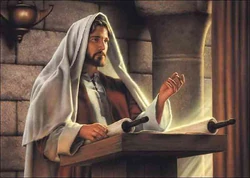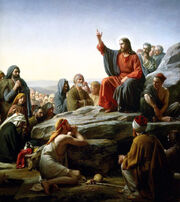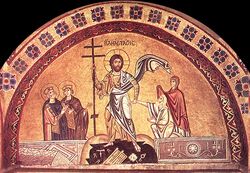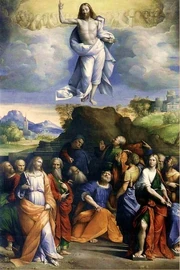| Eliyahu | |
|---|---|

| |
| Eliyahu as Yeudi High Priest | |
| Born | 35 BCE Beiteynu |
| Died | n/a - in Hiding |
| Nationality | Yeudi |
| Mother | Sarahae |
| Known for | Founder of Hosianism |
| Honored in | Hosianism, Ahmadism |
Eliyahu (Luthori: Elijah) is the central figure in Hosianism and a major prophet in Ahmadism. Most Hosian denominations consider him to be the Spirit of God and the Savior of mankind, and that he is currently in Hiding, to return at the end of Terra. Originally the High Priest of the Yeudish Church, Eliyahu was overthrown and exiled, and came to lead a small community of followers that was to become the Hosian Church.
Yeudism rejects the belief that Eliyahu was the Biblical Spirit of God, and considers him a heretical High Priest. In Ahmadism, Eliyahu is considered one of God's (Akim's) important prophets and a bringer of scripture, but not the Spirit of God, nor presently in Hiding.
Annunciation Account[]
Most of the current knowledge on Eliyahu is based on the accounts of the four Annunciants , which together comprise the Annunciation , the main part of the New Word of the Hosian Bible. While the supernatural elements attributed to Eliyahu in the Annunciation are rejected by modern historical scholarship, most scholars accept the existence of a historical character named Eliyahu, who was a High Priest of the Yeudish Church before being removed and exiled.
Unless otherwise stated, the account given her draws from the accounts of the three so-called synoptical Annunciants - Julius, Theodore and Thomas.

Eliyahu preaching to his desert community
Virgin Birth[]
According to all the Annunciation narratives, Elijah was born to the virgin Sarahae, who conceived by the will of God after an angel told her she was to beget a son who would be the Spirit of God. In the deep of winter, Sarah and her husband moved out of Yishelem to the land of their birth, and there, in the open country, Elijah was born. They sought for shelter in the dark, and found it only when a bright light lighted up the lands around them and brought them to a stable. There, a group of shepherds received them and allowed them to lay down in the straw on the stable floor, out of pure kindness, and a vision from God appeared to them explaining the significance of their kindness towards the promised child. The light settled on the stable, proclaiming Elijah's birth to all the land, and a group of wise men from Majatra, even one as far as Squibble came to worship Him and offer Him gifts.
The High Priest of the Yeudish Church received word of the miraculous birth, and after prayers received a vision which scared him greatly, for the Temple was corrupt. And he sought for Elijah in order to take him away from his parents and send him far away from Yishelem, but he found him not, and in time, he died. According to the Annunciant Theodore, this fulfilled the prophecy of Joshua: "You shall have seen the blinding Light, ye Priests - says the HIGHEST, our God - but ye who shall prefer to forget it, shall fall into darkness."
When winter disappeared, they returned to Yishelem, and there they circumcised their child as was the custom.
Elevation to the Priesthood[]
As Elijah was growing up, He occasionally was shown to have miraculous powers. He learned to speak early, and was said to praise God with His first words. One day, when he was to become a man soon he was preferred to the priesthood, and as this was a great honour, he and his parents accepted. Rising quickly through the priesthood, Elijah first learned all there was to learn about the old scriptures, although even in this day, he made pronouncements about this that the Priests did not like, because in their eyes they came perilously close to denying the applicability of the Yeudish law.
Other actions also did not endear the young Elijah to the Priests - the most remarkable scene is where Elijah got so annoyed by merchants who sold sacrifices and other trinkets in the Temple that he chased them out, earning him a reprimand from the High Priest.
The Miracle of the Treasury marks the end of Elijah's time as a priest. One day, Elijah meets a man named Michael, who was a watcher at the Temple before - as is implied - being scapegoated by the Priests for embezzled money. Elijah calls Michael to him, tells him he is still a watcher, and then goes into the Treasury of the Temple. Waiting there through the night without fatigue, at dawn, the coffins miraculously fill to the brim with gold. The Priests see this and reinstate Michael, but Elijah says they are not done yet - they should spread the gold, he says, and they go with him into the city. The High Priest, angered by this, sends Elijah away from the Temple, cursing him for a blasphemer.
Start of Eliyahu's Ministry[]
Elijah is joined by Michael, who leaves the Temple to follow Him. They are soon joined by Theodore, a clerk of the Temple who, after previously being involved in covering up the embezzlement of the Priests, went after Elijah into the city when he and Michael were distributing the gold to the poor, and came to realise the error of his ways. A young acolyte of the Temple named Thomas runs away from the Temple to find Him, and is miraculously led to Him, where he meets Him in time to see his baptism.
Baptism by Matthias[]
Elijah goes to Matthias to let him and his disciples be baptised by the man. Matthias at first denies that he is worthy to baptise him, but at his insistence, he goes ahead. When he baptises Elijah with the sacrifice of Water, a shining light appears, and they hear God's voice proclaiming Elijah to be the Spirit of God. From that point in time, many flock both to Mathias and to Elijah, whose number of disciples grows soon to Twelve.
Return to Yishelem and High Priesthood[]
Exile to the Desert[]
Due to the perceived heresies preached by Eliyahu as High Priest, who called for love and kindness towards all humans, which he considered to be much more important than the rituals in the Katub, Eliyahu was removed from his position by the rest of the Yeudish clergy, and sent into exile in the desert. Several of his closest friends and disciples, calling themselves "the Faithful" (hoi Hosioi), followed him in exile, and became the first Hosian community.

Eliyahu liberating the righteous from Hell during his Second Exile
Forty-day Prayer[]
Eliyahu, in despair because of the persecution of His community, fasted and prayed for forty days in the desert, attended only by the most faithful of his disciples. But he received no answer from God: on the fortieth day, he was answered. In answer, he called his disciples and told them God told him he had to leave them.

Eliyahu leaving into Hiding in Heaven
Second Exile and the Hiding[]
On the eve of the Yeudish Passover feast, which celebrated the start of the Qedarite Migrations, Eliyahu ate with his disciples. At this Last Supper, he told them he had to leave them because of his persecution, and they were desolate, begging him to stay. In a famous scene, Eliyahu reveals that one of his disciples will betray him to his enemies. Indeed, his disiciple Onan had agreed to betray him for 30 pieces of silver, and after Eliyahu hints at Onan's intent, he leaves and returns only as Eliyahu and his disciples hold a vigil during the next night on a mount, bringing with him a group of soldiers.
Eliyahu announces this is the time for him to leave, and as the soldiers seize all his disciples but for Michael, who flees after being told to sheathe his sword and being told he will deny his master three times, he disappears in a flash of light, into what is known has his Second Exile into Hell, or simply The Exile.
Michael tries to free the captured hosioi, but he is found out and to avoid capture, he indeed denies Eliyahu three times. In the end, it is Onan, the traitor, whose remorse impels him to free his former comrades, but they disown him and refuse his pleas for forgiveness, and in despair at his deeds, Onan hangs himself as the other disciples remain with Michael.
The hosioi feared they had lost Eliyahu, and mourned for three days, returning to the hill where Eliyahu disappeared. On the third day, Eliyahu returned, appearing as an old man, for hell had weakend him. He had descended in a second exile into Hell to relieve the world of its sins, and returned triumphant, but weakened. Thomas is the first to recognise him, but he keeps silent, and it is not until Eliyahu reminds the Faithful of his words during the Last Supper that they recognise him.
He stayed with the Disciples for a time, but the persecutions grew ever stronger, for the Yeudists regarded the notion of returning alive from Hell as heretical. Eliyahu, weakened by his experience in Hell and visibly aged, then received a vision from God, and after bidding goodbye to his disciples and asking them to continue His work and preach his Annunciation, he went into Hiding, disappearing in a flash of light.
Religious views[]
Yeudish views[]
Hosian views[]
Hosians consider Eliyahu, whom they also refer to as Eliyahu Hosios or the Lord, to be the Spirit of God announced through Yeudi prophecies as the instrument of God's actions and the Saviour of Mankind. Under the binitarian doctrine, most Hosians hold that as the Spirit of God, Eliyahu is the same being as God, yet a different person or manifestation, sharing His divine essence but embodying especially His love, kindness and faith, and a will to save all human beings. Eliyahu was born of the virgin Sarahae through the agency of God, sent the Light of God to guide the Faithful and is currently considered to be in Hiding in Heaven until the Day of Judgment, after he commanded his disciples to spread and live His Annunciation. According to most mainstream Hosian Churches, Eliyahu freed mankind from all sins pending repentance by going willingly into exile in Hell, humiliating himself. An important Hosian doctrine surrounding Eliyahu is therefore that in Him, God loved the world so much that He would humiliate himself and send His divine spirit to Earth and even to Hell's depths to save and redeem the children of mankind, thus extending the mercy of the Yeudish God to all of Terra.
Ahmadi views[]
In Ahmadism, Eliyahu (Majatran: Elyas) is considered to be a Messenger of God, who was sent to guide the Qedarite Tribes with a new scripture, the Annunciation. The belief in Eliyahu (and all other messengers of God) is required in Ahmadism, and a requirement of being an Ahmadi.
The Ahmadis believe that Eliyahu died a natural death in Kafuristan after his Second Exile as opposed to going into Hiding. After his return from the depths of Hell, Eliyahu fled Beiteynu to avoid being captured by the Yeudists and journeyed towards Kafuristan. He later settled in the city of Helem (Kafuristan) where he died a natural death of old age, and was laid to rest in the Honored Tomb in the same city.
Eliyahu is said to have been a Prophet who possessed miraculous healing powers and had travelled from Beiteynu to southeastern Majatra in the first century.
The Holy Messenger Ahmad, according to Ahmadi belief, is a direct descendant of Eliyahu and the former monarchs of Kafuristan and Al'Badara, the House of al-Majali, still claim direct descent from both Ahmad and Eliyahu.
| Beiteynu < Majatra |
| Portals: History, Geography, Culture, Governance, Diplomacy, Economy, Intelligence, Military |
